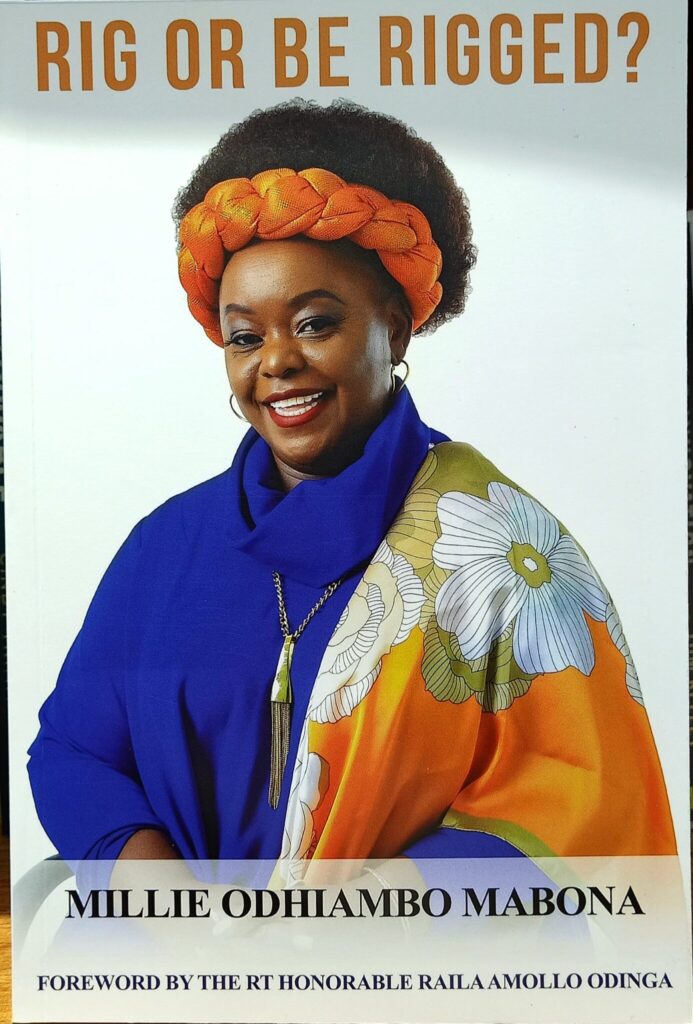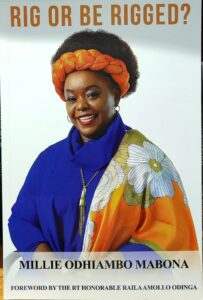Introduction
Rig Or Be Rigged? by Hon. Millie Odhiambo Mabona has drawn significant attention as a valuable contribution to political literature, particularly regarding women’s leadership in Africa.”This book stands as a first-hand account of the intricacies of political life and the challenges women face in this domain. Hon. Millie Odhiambo Mabona (a prominent lawyer, activist, and seasoned politician) draws on her extensive experience to provide insights that are both illuminating and pragmatic. In this review, I will explore the effectiveness of the book in achieving its goals, the possibilities it suggests, what it leaves out, how it compares to others in the field, points that may not be convincing, and personal reflections related to its themes.
Achieving Its Goals
The primary goal of “Rig Or Be Rigged? by Hon. Millie Odhiambo Mabona” is to empower women in politics by sharing valuable lessons learned through personal experience and the experiences of other distinguished women leaders. The author has largely achieved this goal. The book effectively outlines principles that can guide women navigating the complex political landscape in Africa. Each chapter presents practical strategies and candid reflections that resonate with the challenges faced by aspiring female leaders. The author’s candid style invites readers into her world, making the lessons relatable and applicable.
Engaging Narrative
The engaging narrative style employed by Hon. Odhiambo Mabona plays a pivotal role in keeping the reader’s attention. Stories of her experiences, interwoven with anecdotes from other women leaders, illustrate key points. For example, the chapter titled “No Manners Please, We Are in Politics” captures the reader’s interest while imparting critical lessons about the often harsh realities of political life. By combining personal stories with broader observations, the book achieves a balance that enhances its effectiveness.
Suggested Possibilities
“Rig Or Be Rigged? by Hon. Millie Odhiambo Mabona” suggests several possibilities for women in African politics. One of the most compelling is the potential for a paradigm shift in how women engage with political structures. The book emphasizes the importance of resilience and adaptability, encouraging women to embrace their unique strengths and perspectives. This message of empowerment opens up avenues for women to take on leadership roles, fostering a more inclusive political environment.
Exploring Realpolitik
The author introduces the concept of “realpolitik” in relation to female leadership, which underlines the need for women to understand and navigate the existing power dynamics effectively. By presenting strategies to leverage soft power and create meaningful alliances, the book offers practical solutions that could reshape the political landscape for women in Africa. The idea of using a “Bottoms Up approach” to instigate change resonates strongly and suggests that grassroots movements can significantly impact political discourse.
What the Book Leaves Out
While “Rig Or Be Rigged? by Hon. Millie Odhiambo Mabona” is rich in insights, it does leave out some aspects that could have enriched the narrative further. For instance, a deeper exploration of intersectionality in politics could have provided a more nuanced perspective. The author occasionally glosses over the unique challenges faced by women from various socio-economic backgrounds, which may limit the applicability of some principles for all women.
Focus on Urban Perspectives
Moreover, the book primarily focuses on the experiences of women in urban settings. The book could have addressed the challenges that women in rural areas face, as they often encounter different societal pressures and limitations, more comprehensively.Including these perspectives might have created a more holistic understanding of the landscape for female politicians in Kenya and Africa at large.

Comparison to Other Works
In comparing “Rig Or Be Rigged? by Hon. Millie Odhiambo Mabona” to other works on women’s political leadership, it stands out for its personal approach. Many books in this genre tend to adopt a more academic tone, which can alienate some readers. In contrast, the conversational style of Hon. Odhiambo Mabona invites readers in, making complex concepts more digestible.
Unique Insights
Additionally, the unique insights from an author who has experienced the political arena firsthand add considerable value. Unlike other political leadership books that may rely on theory or generalized statistics, this work grounds itself in real-life experiences, making it a significant resource for women in politics. However, it could be beneficial for future editions to incorporate more comparative analyses of women’s leadership across different African countries, thus providing a broader context.
Specific Points Not Convincing
While the book provides many valuable insights, certain points may not be entirely convincing. For example, the assertion that “Is Bad Really Bad?” could benefit from a more nuanced discussion. The simplistic framing of this issue may oversimplify the moral complexities often present in political decisions. Readers may find themselves questioning whether such perspectives can truly apply to all contexts.
Lack of Comprehensive Solutions
Furthermore, while the author offers several strategies for overcoming challenges, some readers might feel that the solutions provided lack depth. For instance, the discussion on “Tantalizing or Soft Power” could be expanded to include more actionable steps for women to implement these concepts in their political careers. The absence of detailed case studies or examples of successful application may leave readers wanting more.
Personal Experiences Related to the Subject
Reflecting on personal experiences related to the themes discussed in “Rig Or Be Rigged? by Hon. Millie Odhiambo Mabona” evokes a sense of connection with the author’s journey. Having participated in various leadership initiatives aimed at empowering women, the challenges and triumphs shared in the book resonate deeply. The practical lessons offered serve as a reminder of the importance of resilience and adaptability in leadership.
Empowerment through Community
Moreover, the emphasis on community support and networking found in the book aligns with experiences in various women’s groups. The collective effort to uplift one another mirrors the “Bottoms Up approach” championed by the author. This community-driven strategy has proven invaluable in navigating the political landscape, reinforcing the notion that collaboration is essential for success.
Where to Purchase
For those interested in exploring “Rig Or Be Rigged? by Hon. Millie Odhiambo Mabona,” it is readily available through various online bookstores. Notably, Nuria Bookstore offers the book at a price of Ksh 1,500. Alternatively, Bookstop Kenya lists it for Ksh 1,800, while Kenyabookshop.com has it priced at Ksh 1,600. These options make it accessible for readers eager to delve into the world of women’s political leadership.

Conclusion
In summary, “Rig Or Be Rigged? by Hon. Millie Odhiambo Mabona” serves as a crucial addition to the discourse on women’s leadership in Africa. The book has effectively achieved its goal of empowering women by sharing relatable experiences and practical strategies. While it leaves out some perspectives and could expand on certain themes, its unique insights and engaging narrative make it a valuable resource. The possibilities suggested for women’s political engagement are encouraging, and the book stands out among others in the genre for its personal touch and practical approach.
Readers interested in the dynamics of political leadership and the role of women in shaping the future will find this book enlightening and inspiring. Ultimately, “Rig Or Be Rigged? by Hon. Millie Odhiambo Mabona” is not just a guide; it is a rallying cry for women to seize their power and shape the political landscape in Africa.



